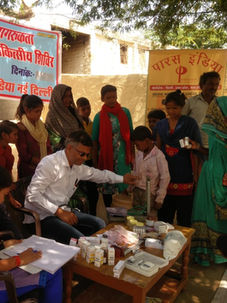

INTRODUCTION
Health is related to gender in a peculiar manner. Women face different set of problems when it comes to health related consequences. They are the last ones in their families to be facilitated with services of professional medical care if diagnosed with life threatening diseases.
It is well known that India has become the antibiotic capital of the globe. It is due to easy access to medicines for cold and fever and lack of awareness that antibiotic resistance has become the new epidemic in our country. It is equally important to spread awareness on the fact that smokeless tobacco products such as gutka and khaini are known to be cancer-causing. Newly delivering mothers can be saved by timely interventions since majority of maternal and newborn deaths occur around the time of birth, typically within the first 24 hours after childbirth. There has been taboo around menstruation and various myths related to it. The shame, stigma and misconception attached to a normal biological cycle have been disempowering women since a long time.
To demystify these myths and to spread awareness we have started various health awareness camps across tribal and rural communities.
AIMS/OBJECTIVES
-
To make people aware of the facilities by the government at various Primary Health Care Centres. To spread knowledge on various National Action plans like National strategic plan on Tuberculosis where the entire cost for the treatment would be subsidized by the government, that there is a Cancer Patient Fund for financial assistance for poor patient etc.
-
Prevention and control of locally endemic diseases by the help of PHCs.
-
Explaining people the economic benefit of sanitation and hygiene.
-
Providing palliative care with the help of professionals.
-
Distribution of medical kits and essential medicines.
-
To empower young girls and women to speak up for seeking medical help for issues related to their body like menstruation, pregnancy, family planning etc.
APPROACH WE FOLLOW
-
Health Camps
Health camps were organized in multiple areas in and around our intervention locations. They were widespread in its scope and covered a huge number of population. There were many instances of malnutrition and other water-borne diseases. Women had multiple problems of chronic anemia. These Health camps were organised as awareness campaign for hygiene and sanitation along with other primary health care.
-
Distribution Of Free Medicines
PARAS India organizes health camps distribution of medicine are conducted on a regular basis. Many people face poor health conditions due to affordability issues or lack of awareness towards health and that cause them chronic diseases. We, at PARAS India strive to promote health and wellness among people through health camp and medicine distribution program.
-
Health Awareness
There are dedicated sessions for HIV awareness too, which is also a pressing problem in the populations we work with. The women were educated about safe contraceptive choices, which is important both for family planning and preventive against HIV and other STDs. The awareness programs were implemented along with Government agencies, which included doctors from district hospitals, eminent private-sector doctors and other Civil Society partners.
-
Immunization
PARAS India also work with the government agencies in the region for the outreach of the immunization, and other monthly health check-ups by doctors. The huge network of our partners in the intervention areas is a facilitator for such drives, which require reaching out to the maximum number of the population. The goodwill that PARAS India enjoys in the areas where we work also helps and eases out the process of dissemination of information pertaining to preventive care.
-
Holistic Approach for Healthcare
PARAS India core strength lies in consolidating a population and empowering them so that they can take crucial decisions on their own. The communities where we work, most of them do not even have Ration Cards, and in its absence, it becomes easy to fall into the vicious debt cycle if they are hit by a major disease. This has lead to poor nutrition and deficit of essential nutrition in those people, as a result of being excluded from the PDS system. PARAS India was able to mobilize many such groups and they were successful in obtaining Ration Cards from the authorities and therefore free medical care in the government hospitals. This enabling exercise also helped them in voicing out their health-related grievances.
-
Secondary Healthcare Many a time when stuck with a medical emergency, tribals do not have access to the better services located in other district or specialized health care. PARAS India have been assisting such people from time to time so that they can avail better services in hospitals.
Such timely assistance has been many a time crucial for saving lives and also has made them more vocal for demanding better health care in the nearby areas.
METHODS
-
Inviting people to participate in camps
-
Organising frequent workshops on health awareness
-
Use of skit, pamphlet distribution, banners and door-to-door information
-
Inviting healthcare professionals for interface
-
Utilising cultural events for speeches to improve community participation for home based palliative care
-
Screening of movies carrying important social issues like Padman, Super 30 etc.
TO SUM UP
-
People are aware of the ill effects of poor sanitation habits.
-
Community participation have brought into better practices.
-
People who never sought medical help from healthcare professionals know the benefits of it.
-
Medical kits have benefitted people into getting timely interventions for better health.
-
People have started being more reasonable and stopped believing in superstitions hovering around them.
-
People are aware about various government schemes on health, health insurances, and fund for cancer patients for poor families and generic medicines available for them.





